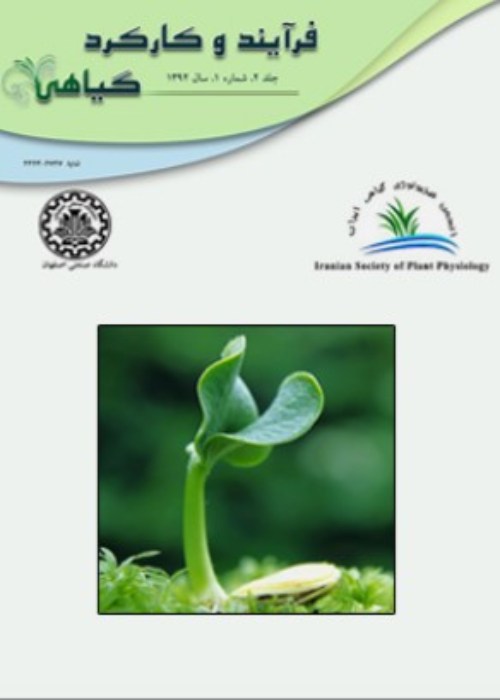Effect of drought stress and stress modifier on biochemical traits of pot marigold (Calendula officinalis L.)
In order to investigate the effect of different levels of drought stress and spraying with stress modifiers, an experiment was conducted in a factorial layout based on completely randomized design in three replications from November to March 2018 in the Agricultural greenhouse and laboratory of Payame Noor University of Urmia. The experimental factors included irrigation intervals with 4 levels (3, 6, 9 and 12 days) and drought stress modifiers at four levels (control (no-spraying), spraying with salicylic acid (2 mM), glycine betaine (5 mM) and zinc sulfate (5 g L-1). The results indicated that the effect of different levels of drought stress and stress modifiers were significant on morphological traits, photosynthetic pigments, physiological, essential oil concentration and yield traits. The highest (0.419 g per pot) and the lowest (0.045 g per pot) root dry weight, were obtained from irrigation intervals of 3 days under zinc sulfate and 12 days irrigation without spraying conditions, respectively. With increasing irrigation interval from three days to 12 days, plant height, root length, root diameter, stem diameter, chlorophyll content a and b and relative water content decreased, but proline, electrolyte leakage, essential oil percentage and leaf temperature increased significantly. It seems that at all levels of irrigation, spraying with glycine betaine in comparison with other modifiers was more effective in increasing the content of chlorophyll a and relative water content and decreasing electrolyte leakage at all irrigation levels. By application of zinc sulfate, the amount of proline was significantly increased. Spraying with salicylic acid reduced the internal leaf temperature. The highest internal leaf temperature (23.93 °C) and proline (180.199 mmol/kg DW) and the lowest internal leaf temperature (21.12 °C) and proline (131.02 mmol/kg DW) were obtained from irrigation intervals of 12 and 3 days, respectively. Although the highest essential oil concentration (0.13%) was obtained from the irrigation interval of 9 days, however, due to the severe decline in plant growth, essential oil yield decreased significantly in this treatment. The lowest essential oil yield was obtained from irrigation interval of 12 days (0.007 g per pot). Based on the results obtained in this experiment, it can be stated that although increasing the irrigation intervals and consequently the occurrence of drought stress, yield of marigold plant is reduced, but by using drought stress modifiers can reduce the effects of drought stress on this plant.
- حق عضویت دریافتی صرف حمایت از نشریات عضو و نگهداری، تکمیل و توسعه مگیران میشود.
- پرداخت حق اشتراک و دانلود مقالات اجازه بازنشر آن در سایر رسانههای چاپی و دیجیتال را به کاربر نمیدهد.


